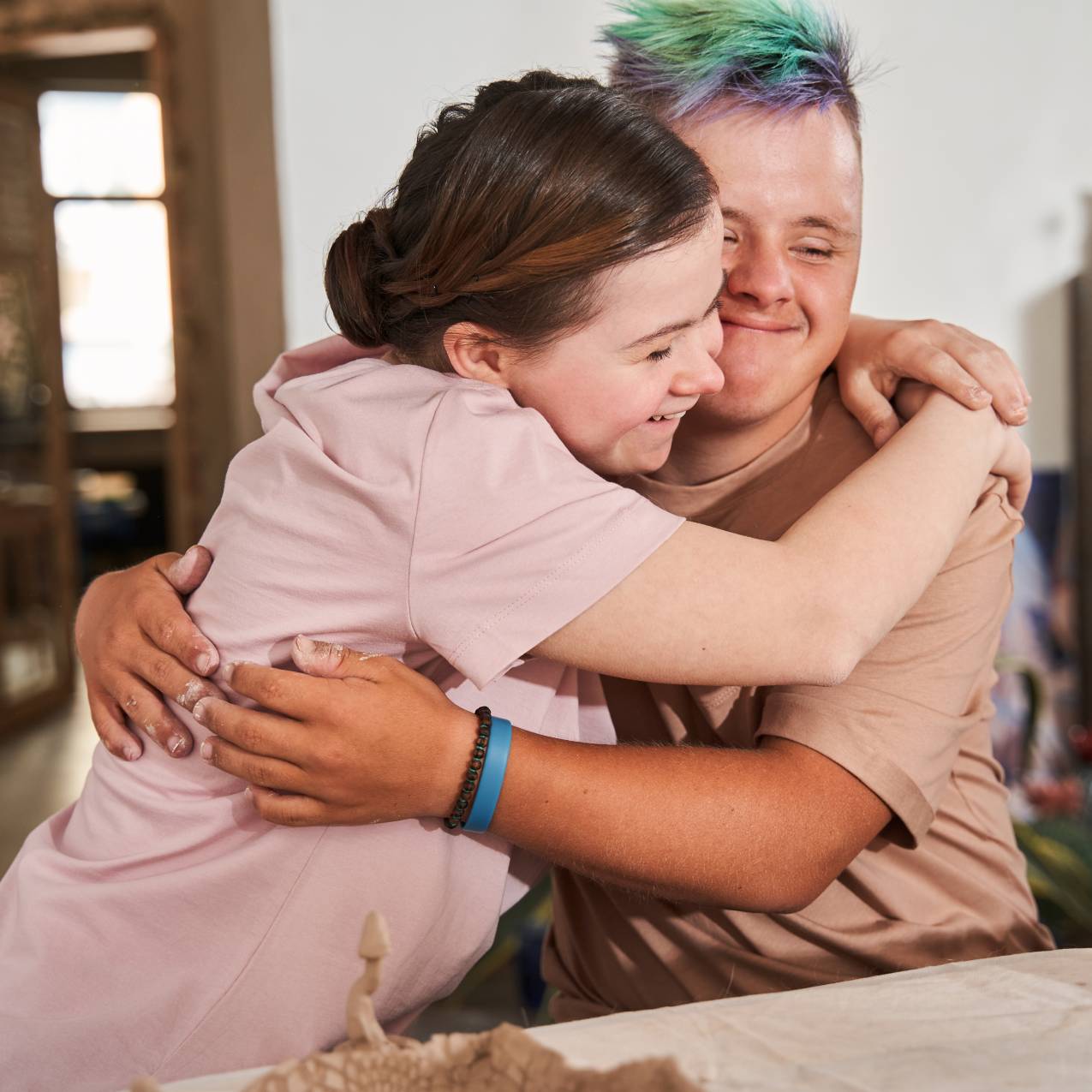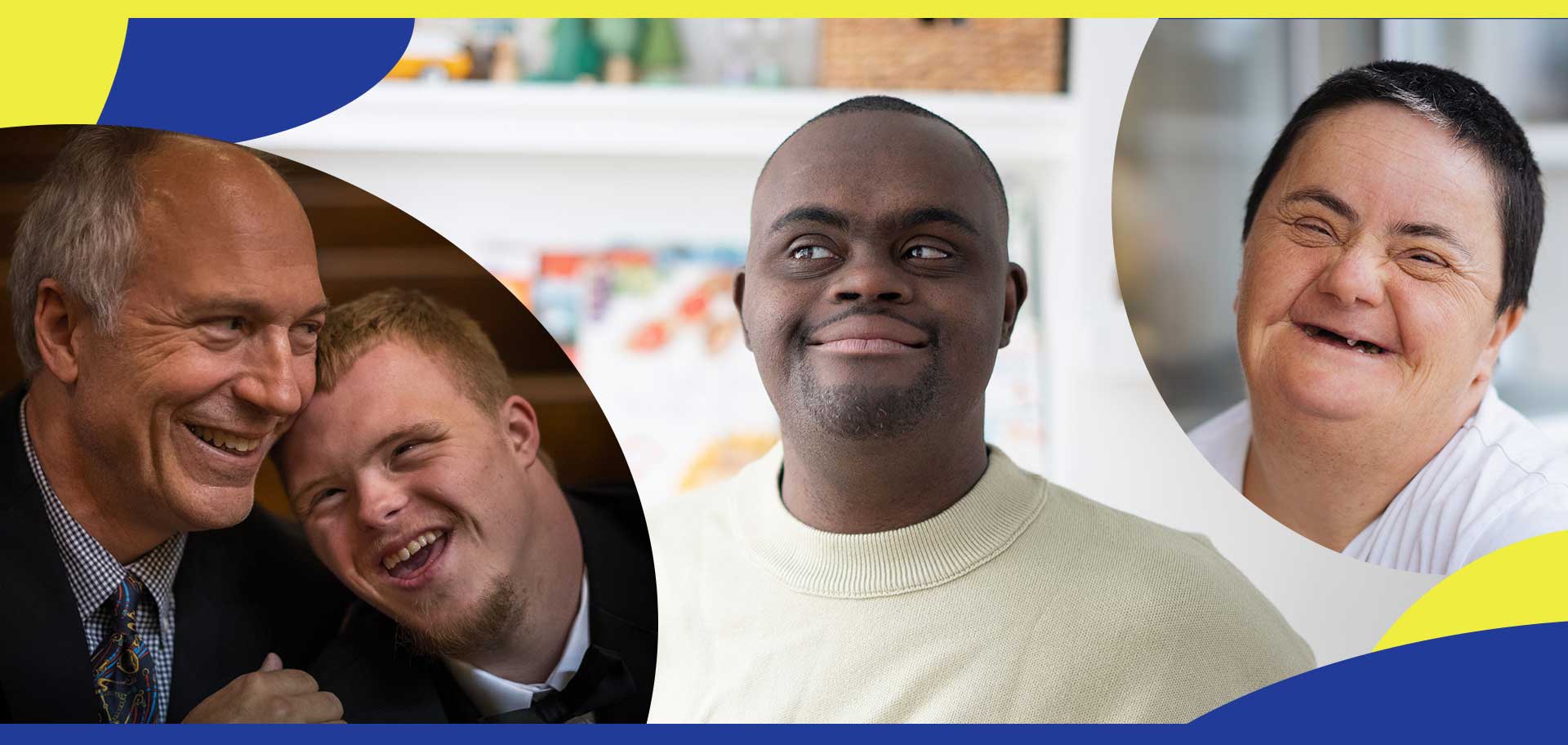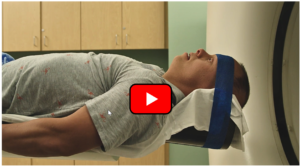Watch the video here
The ABATE Study is testing a potential treatment for Alzheimer’s disease in people with Down Syndrome.
People with Down syndrome are at high risk of getting Alzheimer’s disease. Alzheimer’s disease is a type of dementia. Dementia is a condition where people have problems with memory and thinking.
We have two goals:
- We want to learn more about the study treatment’s safety.
- We want to see if it slows down memory loss and thinking problems in people with Down syndrome.
The study is being conducted in collaboration with the Alzheimer’s Clinical Trials Consortium – Down Syndrome – ACTC-DS.
We are asking people with Down syndrome to take part in the ABATE Study.

Who can join the ABATE Study?
You may be able to join this study if you:
Have Down Syndrome
Do not have dementia
Are between 35 and 50 years old
Have a study partner
A study partner is someone who knows you well and spends a lot of time with you (like a caregiver or family member or friend). They will attend all the study visits with you and will help record symptoms and side effects.
Taking part in the study is your choice. You can say yes, or you can say no, and you can change your mind at any time.
We hope that people will decide to join, because it could help us find a treatment for Alzheimer’s in people with Down syndrome.
What is the study treatment?
The study treatment in ABATE is called ACI-24.060. It is not yet approved. The ABATE study is an important step in testing ACI-24.060’s safety and showing whether it can slow down Alzheimer’s disease in people with Down syndrome.
In the ABATE Study, participants will receive either ACI-24.060 or an inactive treatment called a “placebo.” During the study, nobody will be told which treatment they receive. That way, when the study is over, we can compare the results to see if ACI-24.060 slows down memory loss and thinking problems the way we hope it will.
All the treatments, tests, and doctor visits that are part of the study are included at no cost. And costs for visits, like travel or meals, will be reimbursed.

What is ACI-24.060?
ACI-24.060 is designed to teach the body’s immune system to get rid of amyloid plaques in the brain. This type of treatment is called “immunotherapy.” It’s similar to the way a vaccine teaches the body to clear an infection.
Removing beta amyloid from the brain is recognized as an effective way to slow down memory loss and thinking problems in Alzheimer’s disease. The U.S. Food and Drug Administration has approved three antibody drugs to treat early Alzheimer’s that work this way.
ACI-24.060 is designed to teach the body to make its own antibodies against amyloid plaques.
If ACI-24.060 is successful clinical trials, it could offer the potential to remove amyloid while avoiding the side effects associated with antibody drugs.

Safety of ACI-24.060
We are taking every precaution to protect the safety of participants in the ABATE Study. No safety concerns have been reported to date.
The ABATE study is taking a cautious, stepwise approach to studying ACI-24.060, with an independent safety review between each step. In the first part of the ABATE Study, we treated more than 40 people who do not have Down syndrome but do have early Alzheimer’s disease. We began asking people with Down syndrome to join ABATE only after we had initial safety results from the first part of the study.
The first participants with Down syndrome started to be treated in the middle of 2023.
There have been multiple reviews by an independent group of experts who oversee the trial. These reviews are required for all clinical trials to protect the safety of participants. None of these expert reviews have raised safety concerns over ACI- 24.060.
What happens in the ABATE Study?
The ABATE study will take about two years. It is divided into three parts:
Screening period
The study team will do tests to see if you qualify to join the study. If you qualify, we will ask you and your study partner to sign a consent form that says you do understand and are willing to participate. You are always allowed to change your mind, even after you sign the form.
Treatment period
You will get either ACI-24.060 or placebo six times. You will also have visits at the study clinic and phone calls so the study team can check your health and check how the study treatment is working in your body.
Follow-up period
You will have some visits to check your health and see how the study treatment is working in your body.

What is included?
All the treatments, tests, and doctor visits that are part of the study are included at no cost.
The tests will include general medical examinations to monitor health status. You will also have regular blood and urine tests and heart monitoring. There will be memory and thinking tests and brain imaging including MRI and PET scans.
The study team will also record side-effects and the use of other medicines, with the help of your study partner.
USA
Vanderbilt University Medical Center
Center for Cognitive medecine
Blake Wilson
615-936-4997
1601 23rd Avenue South,<br />37212, Nashville, Tennessee
University of Kansas Medical Center
Alzheimer’s Disease Research Center
Keri Cox
913-945-7037
4350 Shawnee Mission Parkway, Suite 1200, 66205, Fairway, Kansas
Barrow Neurological Institute
Alzheimer’s Disease and Memory Disorders Division
Jalisa Santiago
800-392-2222
240 W Thomas Rd,<br />Suite 301,<br />85013, Phoenix, Arizona
Washington University in St. Louis
Britany Nelson
314-747-8425
660 S. Euclid, CB 8111,<br />63110, St-Louis, Missouri
Massachusetts General Hospital (MGH)
Mikayla Shaffer
617-643-8912
185 Cambridge Street,<br />Suite 2.222,<br />02114, Boston, Massachusetts
Indiana University / IU Health
Neuroscience Center
Kate Phillips
317-278-3260
355 W 16th Street, 46202, Indianapolis, Indiana
UT Health San Antonio
Biggs Institute for Alzheimer’s and Neurodegenerative Diseases
Floyd Jones
210-450-3158
MC 8070, 7703 Floyd Curl Dr.<br />78229, San Antonio, Texas
UK
King’s College London
Institute of Psychiatry, Psychology and Neuroscience
Charlie Mizon
07743754760
16 De Crespigny Park, London, SE5 8AF
Windsor Research Unit
Fulbourn Hospital
Naomi Thomas & Natalie Tanzarella
01223 219789 or 07517 829298
Fulbourn Hospital, Cambridge,CB21 5EF
NIHR Oxford Health Clinical Research Facility
Warneford Hospital
Abigail Stewart & Rachel Delahay
01865902135
Warneford Lane, Oxford, OX3 7JX
Spain
Hospital de la Santa Creu I Sant Pau
Juan Fortea & Isabel Barroeta
C/ Mas casanovas, 90. Bloc A, planta -2 (AGDAC), 08025, Barcelona
Hospital Universitario de la Princesa
Fernando Moldenhauer Diaz
915 202 222
Calle de Diego de León, 62,28006, Madrid
Hospital Universitario Marqués de Valdecilla
Unidad de Deterioro Cognitivo, Servicio de Neurología
Eloy Rodriguez & Andrea Corrales
942 202 520 extensión73650
Av. de Valdecilla, 25,39008, Santander
Hospital Universitario Virgen De Las Nieves
Consultas Externas
Elizabeth Garcia Penalver
958 895 426
Calle Dr. Azpitarte 4, ( 5ª planta), 18012, Granada
News and resources
News
10 December 2024 – Click to read AC Immune’s press release on interim safety data from the ABATE Trial in participants with Down syndrome.
Below you will find answers to frequently asked questions, along with videos and additional information about the ABATE Study.
We hope you will want to learn more. If you do, contact the clinic nearest you and talk to members of the research team about whether the study is right for you.
FAQs
What is the ABATE Study?
The ABATE Study is a clinical trial that is testing a potential treatment for Alzheimer’s disease in people with Down syndrome.
We have two goals:
• To learn more about the treatment’s safety
• To see if it slows down memory loss and thinking problems Read more about the study here.
What is a clinical trial?
Clinical trials are how we find new safe and effective medicines. They are a type of research study designed to test experimental treatments under controlled conditions to see if they are safe and test how well they work.
What is the study treatment?
ACI-24.060 is the potential treatment we are testing in ABATE. It is not yet on the market. ACI-24.060 may help to remove a protein called amyloid in the brain. This could slow down memory loss and thinking problems.
ACI-24.060 is designed to teach the body’s immune system to remove amyloid build-ups in the brain. This type of treatment is called “immunotherapy.” It’s similar to the way a vaccine teaches the body to clear an infection. Read more about ACI-24.060 here.
Why does the ABATE Study use a placebo?
Placebos are inactive treatments used in most clinical trials of potential new medicines. They help researchers see whether a potential new medicine actually works by comparing it against an inactive treatment.
At the end of the ABATE Study, we will look to see if ACI-24.060 slowed down memory loss and thinking problems compared with the placebo.
Is it safe?
One of the main goals of the ABATE Study is to learn more about the safety of ACI-24.060. So far, no safety concerns have been raised. Read more about safety here.
Why is ABATE asking people with Down syndrome to participate?
People with Down syndrome are at high risk of getting Alzheimer’s disease. Alzheimer’s disease is a type of dementia. Dementia is a condition where people have problems with memory and thinking.
Because the risk is so much higher for people with Down syndrome, it’s important to do research to better understand Alzheimer’s in people with Down syndrome and to develop treatments for it.
Read more about Alzheimer’s disease and Down syndrome here.
Can I join the ABATE Study?
You may be able to join this study if you:
- Have Down syndrome
- Do not have dementia
- Are between 35 and 50 years old
- Have a study partner
A study partner is someone who knows you well and spends a lot of time with you (like a caregiver or family member or friend). They will attend all the study visits with you and will help record symptoms and side effects.
What’s a study partner?
Your study partner is someone who could support you during your participation. For example, they could be a family member or any relative close to you, or a caregiver.
Why should I consider participating?
The ABATE Study is the one of first clinical trials to test a potential treatment for Alzheimer’s disease in people with Down Syndrome.
Right now, there is no treatment approved to treat Alzheimer’s disease and dementia in people with Down syndrome. Your participation could help us find a treatment to slow down Alzheimer’s disease in people with Down syndrome.
How can I participate?
If you are interested in joining the ABATE Study, please contact your nearest research center to learn more and to see if you qualify.
Do I have to participate if I qualify?
No. Taking part in the study is your choice. You can say yes, or you can say no, and you can change your mind at any time.
We hope that people will decide to join, because it could help us find a treatment for Alzheimer’s in people with Down syndrome.
Where are the research centers?
ABATE is recruiting participants at research centers across the United States, UK and Spain. You can see the locations here.
What happens if I participate?
There are three parts to the study.
Screening: The study team will do tests to see if you qualify to join the study. If you qualify, you and your study partner will sign consent forms before you begin.
Treatment: You will get either the study treatment or an inactive treatment called a “placebo” 6 times. You will also have visits at the study clinic and phone calls so the study team can check your health and check how the treatment is working in your body.
Follow-up: You will have some visits to check your health and see how the treatment is working in your body.
Learn more about what happens in the ABATE Study here.
How long does the trial last?
The study lasts for about 2 years.
What does it cost?
All the treatments, tests, and doctor visits that are part of the study are included at no cost. And costs for visits, like travel or meals, will be reimbursed.
What happens after the trial?
If you participate in the study, after it is over you can still talk to the research team if questions come up. But you will see your own doctor for regular medical care.
When all the participants are finished, we will review all the information we collected to figure out what we learned about the treatment. We also will share what we learned with the participants and with people in the Down syndrome and Alzheimer’s disease communities.
After that, we publish what we learned about the treatment for other scientists so that they can learn from the study too.
Resources
Learn about Alzheimer’s disease and Down syndrome
This website from the US National Institute on Aging contains information about Alzheimer’s disease research in people with Down syndrome and resources for caregivers of people with Down syndrome and Alzheimer’s disease.
Learn about Clinical Trials
This Clinical Research Glossary from the Multi-Regional Clinical Trials Center of Brigham and Women’s Hospital and Harvard offers easy-to-understand definitions of words that are used in clinical research.
What Is Clinical Research? is a video by the US National Institutes of Health (NIH). It explains what clinical research is and how you can participate and contribute to medical advances.
Clinical Research Versus Medical Treatment is a webpage from the US Food and Drug Administration (FDA). It provides information about clinical trials, how they are different from regular medical treatment, and who should consider participating.
Patient Safety in Clinical Trials is a video by the National Cancer Institute. It talks about how participants are protected in clinical trials. This information is true for all trials, not just trials studying cancer.
Understanding Placebo is a video by J&J Innovative Medicine. It explains what a placebo is, and why placebos are important to testing new medicines in clinical trials.
Explaining Randomization in Clinical Trials is a video by the Office for Human Research Protections in the U.S. Department of Health and Human Services. It explains how and why participants are randomly assigned to different groups in clinical trials.





